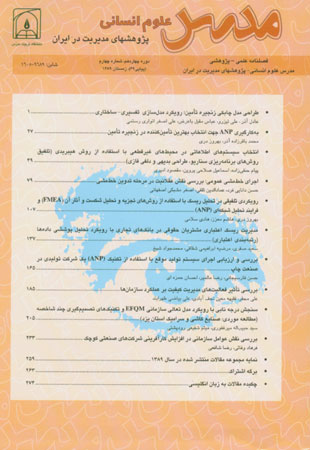The Nature of Managerial Work in Iran Comparing to Other Countries
Abstract:
This paper is based on a research conducted among Iranian managers. The qualitative study used Mintzberg’s “shadow-observation” method to study five Iranian managers in a period of one week and compare the results to information of some other countries including the US. The research explores the characteristics and content of the Iranian managers’ jobs. The paper presents the results from the characteristics of Iranian managers in form of a work pattern. The work-pattern indicates the average of 8 hours and 6 minutes of daily work for Iranian managers spending 13% on desk work, 12% on telephone calls, 43% on arranged meetings, 17% on un arranged meetings, 3% tours, 5% business lunches, 4% business travels and 4% on delays. Allocating times to delays has not been reported in Mintzberg’s research, studying American managers, but it has been reported among Indian managers. With regard to the content of managerial jobs, Mintzberg’s model has been extended and enhanced a twelve managerial roles model has been developed for Iranian managers. The twelve roles are: figurehead, leader, liaison, monitor, disseminator, spokesperson, entrepreneur, resource handler, negotiator, system-developer, system-protector, self-managing and social role. The importance of “mentoring (teaching)” and “social” roles for Iranian managers managing in a less-developed economy and collectivistic culture compared with American managers (managing in a more developed-economy and individualist culture) is explained. Comparative analyses of the results of the current study and those of researches replicating Mintzberg’s study in some countries including the USA, Japan, Korea, Hong Kong, Singapore, China and India are discussed in this paper. To sum up, the paper refers to some Iran’s national characteristics such as: les-developed economy and lower level of education, collectivistic and paternalistic management culture, and tendency toward verbal communication explaining the cross-national differences observed.
Language:
Persian
Published:
Human Sciences MODARES, Volume:10 Issue: 1, 2006
Page:
245
magiran.com/p372956
دانلود و مطالعه متن این مقاله با یکی از روشهای زیر امکان پذیر است:
اشتراک شخصی
با عضویت و پرداخت آنلاین حق اشتراک یکساله به مبلغ 1,390,000ريال میتوانید 70 عنوان مطلب دانلود کنید!
اشتراک سازمانی
به کتابخانه دانشگاه یا محل کار خود پیشنهاد کنید تا اشتراک سازمانی این پایگاه را برای دسترسی نامحدود همه کاربران به متن مطالب تهیه نمایند!
توجه!
- حق عضویت دریافتی صرف حمایت از نشریات عضو و نگهداری، تکمیل و توسعه مگیران میشود.
- پرداخت حق اشتراک و دانلود مقالات اجازه بازنشر آن در سایر رسانههای چاپی و دیجیتال را به کاربر نمیدهد.
In order to view content subscription is required
Personal subscription
Subscribe magiran.com for 70 € euros via PayPal and download 70 articles during a year.
Organization subscription
Please contact us to subscribe your university or library for unlimited access!


